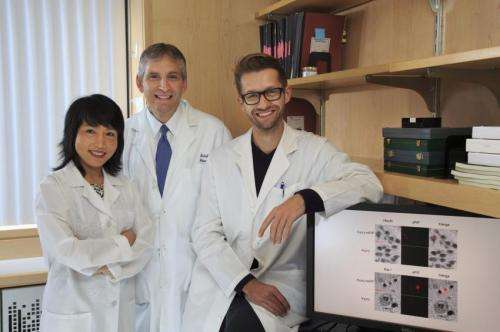Brain injuries no match for sPIF treatment

Researchers at Yale School of Medicine and their colleagues have uncovered a new pathway to help treat perinatal brain injuries. This research could also lead to treatments for traumatic brain injuries and neurodegenerative disorders such as Alzheimer's and Parkinson's.
The findings are published in the Sept. 8 issue of Proceedings of the National Academy of Sciences.
The microRNA let-7 is known to cause the death of neurons in the central nervous system. The research team found that a synthetic molecule derived from the embryo called PreImplantation Factor (sPIF) protects against neuronal death and brain injury by targeting let-7.
"We would never have connected the dots between PIF and let-7 without prior knowledge and experience with let-7 and H19, a developmentally regulated gene that is highly expressed in the developing embryo," said senior author Yingqun Huang, M.D., associate professor in the Department of Obstetrics, Gynecology & Reproductive Sciences at Yale School of Medicine.
Using a rat perinatal brain injury model, Huang and the team found that sPIF rescued damaged neurons and reduced inflammation. The team performed a series of in vivo and in vitro experiments and found that sPIF helped to stop the production of let-7. "We showed that sPIF works by destabilizing the key microRNA processing protein called KH-type splicing regulatory protein," said Huang.
Lead author Martin Mueller, who helped develop the rat perinatal brain injury model, was surprised at the consistency of the results from both the in vivo and in vitro studies. "Collectively, our findings suggest that sPIF mitigates brain damage through a novel pathway," said Mueller. "We saw more cortical brain volume and more neurons restored in brain-damaged animals receiving sPIF."
"For the first time, we have clear indication to pursue a new line of investigation in the treatment of perinatal brain injury, and possibly traumatic brain injury," said co-author Michael Paidas, M.D., professor in the Department of Obstetrics, Gynecology & Reproductive Sciences at Yale School of Medicine.
Paidas, who is also vice chair of obstetrics at Yale, has helped to characterize PIF with co-author Eytan R. Barnea, who discovered the peptide. Barnea is founder of the Society for the Investigation of Early Pregnancy (SIEP) and chief scientific officer of BioIncept, LLC.
Based on this promising data, the FDA has awarded sPIF fast-track designation and allowed a phase 1 sPIF clinical trial to treat patients with autoimmune liver disease.
More information: Preimplantation factor promotes neuroprotection by targeting microRNA let-7 , Proceedings of the National Academy of Sciences, 2014. www.pnas.org/cgi/doi/10.1073/pnas.1411674111



















